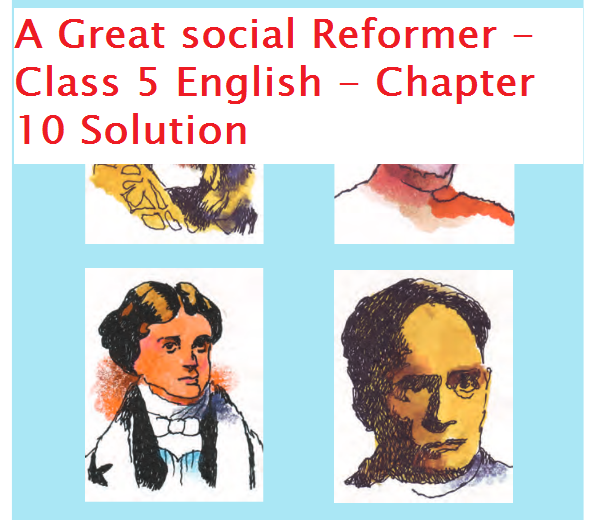WB Board Class 5 English Chapter 10 A Great Social Reformer Solution – West Bengal Board of Secondary Education (WBBSE) Class 5 English Book Lesson 10 A Great Social Reformer Story Questions Answers are given here. A Great Social Reformer Class 5 Solution can be helpful for students in the upcoming exams.

Activity 1 Solution
Complete the following sentences with information from the text:
1. Begum Rokeya was born __________________________.
Answer: Begum Rokeya was born in an affluent Muslim family.
2. At home she learnt _________________________________.
Answer: At home she learnt Arabic and Persian.
3. She never went _____________________________________.
Answer: She never went to school.
4. She wrote ___________________________________________.
Answer: She wrote some great books in Bengali and English.
Activity 2 Solution
Table A and Table B have words with opposite meanings. Let’s match Table A with Table B:
Answer:
| A | B |
| (a) Kind | Cruel |
| (b) Poor | Rich |
| (c) Advantaged | Disadvantaged |
| (d) Remember | Forget |
Activity 3 Solution
Let’s write ‘T’ for true and ‘F’ for false statements in the given boxes :
(1) Begum Rokeya never thought about others.
Answer: F
(2) Begum Rokeya demanded education for women.
Answer: T
(3) She wrote against social injustice.
Answer: T
(4) She never felt the importance of women in a family.
Answer: F
Activity 4 Solution
Find out the word-clusters (describing word + naming word) from the above text:
(i) Social reforms.
(ii) Healthy __________.
Answer: Healthy girls.
(iii) ___________ women.
Answer: Remarkable women.
(iv) First ____________.
Answer: First pioneer.
(v) _________ humanist.
Answer: Strong humanist.
(vi) Famous ____________.
Answer: Famous books.
(vii) Ideal _____________.
Answer: Ideal state/woman.
(viii) __________ books.
Answer: Great books.
Activity 5 Solution
Put the punctuation marks in the following sentences. The first one is done for you :
(i) vivekananda said, ‘all indians are my brothers.’
Answer: Vivekananda said, ‘All Indians are my brothers.’
(ii) i am rokeyas friend said the lady
Answer: ‘I am Rokeya’s friend,’ said the lady.
(iii) who are you oh you are wounded
Answer: ‘Who are you?’, oh! you are wounded.
(iv) i know there are many birds like crow parrot mynah
Answer: I know there are many birds like crow, parrot, mynah.
(v) netaji founded ajad hind fauj
Answer: Netaji founded ‘Ajad Hind Fauj.
(vi) vidyasagar was a social reformer
Answer: Vidyasagar was a social reformer.
Activity 6 Solution
Let’s fill in the blanks with appropriate prepositions:
Swami Vivekananda was born _____ 1863. He was born ______ Calcutta. He belonged ______ a rich family. _______ those days our country was ________ the British rule. Vivekananda felt for the misery ______ the Indians.
Answer:
Swami Vivekananda was born in 1863. He was born in Calcutta. He belonged to a rich family. In those days our country was under the British rule. Vivekananda felt for the misery of the Indians.
Activity 7(a) Solution
Let’s classify the personal pronouns and possessive pronouns from the passage:
Answer:
Personal Pronoun – He, We.
Possessive Pronoun – His, Our.
Activity 7(b) Solution
Change the personal pronouns used in activity 7(a) into possessive pronouns. One is done for you :
| Personal Pronouns | Possessive Pronouns |
| He | His |
| Answer: We | Answer: Our |
Activity 8 Solution
Use the following hints and write ten sentences about Henry Louis Vivian Derozio:
Answer: Born on April 18, 1809, in Entally, Henry Louis Vivian Derozio, an Indian English poet, was raised in Kolkata by his parents, Francis Derozio and Sophie Johnson. Educated at David Drummond’s “Dhurramtallah Academy” school, he later embarked on a career teaching English Literature and History at Hindu College. Progressing in his literary pursuits, Derozio assumed roles such as Assistant editor of “The India Gazette” and editor of publications like “The Calcutta Gazette,” “The East Indian,” and “The Bengal Annual.” Amidst his editorial responsibilities, he dedicated his leisure time to composing poetry, with notable works including “To India, My Native Land,” “The Harp of India,” and “The Fakir of Jungheera.” Tragically, he passed away on December 26, 1831.






